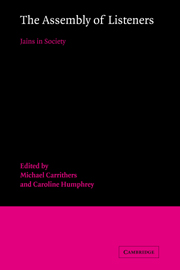Book contents
- Frontmatter
- Contents
- List of illustrations
- List of contributors
- Acknowledgements
- Map: South Asia
- Introduction
- 1 Jains as a community: a position paper
- 1 JAIN IDEALS AND JAIN IDENTITY
- 2 LOCAL JAIN COMMUNITIES
- 3 JAINS IN THE INDIAN WORLD
- 4 NEW JAIN INSTITUTIONS IN INDIA AND BEYOND
- Conclusion
- Glossary and pronunciation
- Select bibliography
- Index
Conclusion
Published online by Cambridge University Press: 07 October 2011
- Frontmatter
- Contents
- List of illustrations
- List of contributors
- Acknowledgements
- Map: South Asia
- Introduction
- 1 Jains as a community: a position paper
- 1 JAIN IDEALS AND JAIN IDENTITY
- 2 LOCAL JAIN COMMUNITIES
- 3 JAINS IN THE INDIAN WORLD
- 4 NEW JAIN INSTITUTIONS IN INDIA AND BEYOND
- Conclusion
- Glossary and pronunciation
- Select bibliography
- Index
Summary
The discussions of a Jain ‘community’ in this book have not always been in agreement. Yet we feel that the idea is useful. It can be seen to be operational on at least two levels, that of the notional or ideal community (Carrithers, Banks), a theory held by Jains themselves, and that of actual communities, several of which are described in this volume. Even in the latter sense ‘community’ points to a reality which is complex, multivalent, subject to many historical contingencies, and often virtually in abeyance. Nevertheless, there are distinct sections of Indian society, made up of Jains, which cannot be adequately defined in terms of other prevalent concepts, such as ‘caste’, ‘sect’, ‘class’ or ‘political group’. If such groups can best be described as communities, even though not all of the criteria outlined in the position paper (chapter i) may be present at any given time, the essential element is the matter of social reproduction. The Jains, with their history stretching over millennia, give us an example of this process – one for which this book has only been able to hint at the complex agencies involved.
The chapters submitted by contributors provided us with defining criteria of community additional to those in the position paper. One of these in the synchronic dimension is the intensity of interaction occurring within the given social group (Cottam Ellis). When considered, this leads to the question of the dominant identity within a choice of identities.
- Type
- Chapter
- Information
- The Assembly of ListenersJains in Society, pp. 287 - 294Publisher: Cambridge University PressPrint publication year: 1991



